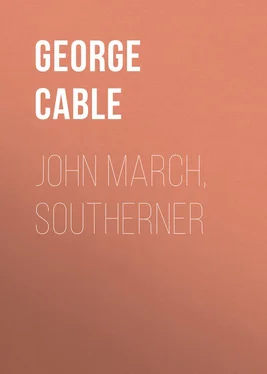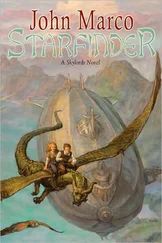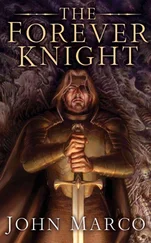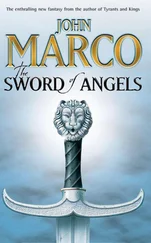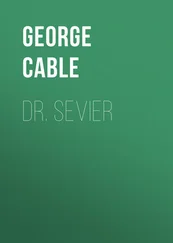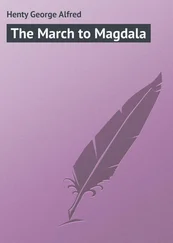George Cable - John March, Southerner
Здесь есть возможность читать онлайн «George Cable - John March, Southerner» — ознакомительный отрывок электронной книги совершенно бесплатно, а после прочтения отрывка купить полную версию. В некоторых случаях можно слушать аудио, скачать через торрент в формате fb2 и присутствует краткое содержание. Жанр: foreign_antique, foreign_prose, на английском языке. Описание произведения, (предисловие) а так же отзывы посетителей доступны на портале библиотеки ЛибКат.
- Название:John March, Southerner
- Автор:
- Жанр:
- Год:неизвестен
- ISBN:нет данных
- Рейтинг книги:3 / 5. Голосов: 1
-
Избранное:Добавить в избранное
- Отзывы:
-
Ваша оценка:
- 60
- 1
- 2
- 3
- 4
- 5
John March, Southerner: краткое содержание, описание и аннотация
Предлагаем к чтению аннотацию, описание, краткое содержание или предисловие (зависит от того, что написал сам автор книги «John March, Southerner»). Если вы не нашли необходимую информацию о книге — напишите в комментариях, мы постараемся отыскать её.
John March, Southerner — читать онлайн ознакомительный отрывок
Ниже представлен текст книги, разбитый по страницам. Система сохранения места последней прочитанной страницы, позволяет с удобством читать онлайн бесплатно книгу «John March, Southerner», без необходимости каждый раз заново искать на чём Вы остановились. Поставьте закладку, и сможете в любой момент перейти на страницу, на которой закончили чтение.
Интервал:
Закладка:
"President Garnet! I hope yo' well, sir? Aw at least," noticing the lame arm, "I hope yo' mendin'."
"Thank you, Brother March, I'm peart'nin, as they say." The Major smiled broadly until his eye fell again upon the mulatto. The Judge saw him stiffen.
"C'nelius only got back Sad'day," he said. The mulatto crouched in his saddle and grinned down upon his mule.
"He told me yo' wound compelled slow travel, sir; yes, sir. Perhaps I ought to apologize faw hirin' him, sir, but it was only pending yo' return, an' subjec' to yo' approval, sir."
"You have it, Brother March," said Major Garnet suavely, but he flashed a glance at the teamster that stopped his grin, though he only said, "Howdy, Cornelius."
"Brother March, let me make you acquainted with one of our boys. You remember Squire Ravenel, of Flatrock? This is the only son the war's left him. Adjutant, this is Judge March of Widewood, the famous Widewood tract. Jeff-Jack was my adjutant, Brother March, for a good while, though without the commission."
The Judge extended a beautiful brown hand; the ragged youth grasped it with courtly deference. The two horses had been arrogantly nosing each other's muzzles, and now the Judge's began to work his hinder end around as if for action. Whereupon:
"Why, look'e here, Brother March, what's this at the back of your saddle?"
The Judge smiled and laid one hand behind him. "That's my John – Asleep, son? – He generally is when he's back there, and he's seldom anywhere else. Drive on, C'nelius, I'll catch you."
As the wagon left them the child opened his wide eyes on Jeff-Jack, and Major Garnet said:
"He favors his mother, Brother March – though I haven't seen – I declare it's a shame the way we let our Southern baronial sort o' life make us such strangers – why, I haven't seen Sister March since our big union camp meeting at Chalybeate Springs in '58. Sonnie-boy, you ain't listening, are you?" The child still stared at Jeff-Jack. "Mighty handsome boy, Brother March – stuff for a good soldier – got a little sweetheart at my house for you, sonnie-boy! Rosemont College and Widewood lands wouldn't go bad together, Brother March, ha, ha, ha! Your son has his mother's favor, but with something of yours, too, sir."
Judge March stroked the tiny, bare foot. "I'm proud to hope he'll favo' his mother, sir, in talents. You've seen her last poem: 'Slaves to ow own slaves – Neveh!' signed as usual, Daphne Dalrymple? Dalrymple's one of her family names. She uses it to avoid publicity. The Pulaski City Clarion reprints her poems and calls her 'sweetest of Southland songsters.' Major Garnet, I wept when I read it! It's the finest thing she has ever written!"
"Ah! Brother March," the Major had seen the poem, but had not read it, "Sister March will never surpass those lines of her's on, let's see; they begin – Oh! dear me, I know them as well as I know my horse – How does that – "
"I know what you mean, seh. You mean the ballad of Jack Jones!
"'Ho! Southrons, hark how one brave lad
Three Yankee standards – '"
"Captured!" cried the Major. "That's it; why, my sakes! Hold on, Jeff-Jack, I'll be with you in just a minute. Why, I know it as – why, it rhymes with 'cohorts enraptured!' – I – why, of course! – Ah! Jeff-Jack it was hard on you that the despatches got your name so twisted. It's a plumb shame, as they say." The Major's laugh grew rustic as he glanced from Jeff-Jack, red with resentment, to Judge March, lifted half out of his seat with emotion, and thence to the child, still gazing on the young hero of many battles and one ballad.
"Well, that's all over; we can only hurry along home now, and – "
"Ah! President Garnet, is it all over, seh? Is it, Mr. Jones?"
"Can't say," replied Jeff-Jack, with his down-drawn smile, and the two pairs went their opposite ways.
As the Judge loped down the hot turnpike after his distant wagon, his son turned for one more gaze on the young hero, his hero henceforth, and felt the blood rush from every vein to his heart and back again as Mr. Ravenel at the last moment looked round and waved him farewell. Later he recalled Major Garnet's offer of his daughter, but:
"I shall never marry," said John to himself.
V.
THE MASTER'S HOME-COMING
The Garnet estate was far from baronial in its extent. Rosemont's whole area was scarcely sixty acres, a third of which was wild grove close about three sides of the dwelling. The house was of brick, large, with many rooms in two tall stories above a basement. At the middle of the north front was a square Greek porch with wide steps spreading to the ground. A hall extended through and let out upon a rear veranda that spanned the whole breadth of the house. Here two or three wooden pegs jutted from the wall, on which to hang a saddle, bridle, or gourd, and from one of which always dangled a small cowhide whip. Barbara and Johanna, hand in hand – Johanna was eleven and very black – often looked on this object with whispering awe, though neither had ever known it put to fiercer use than to drive chickens out of the hall. Down in the yard, across to the left, was the kitchen. And lastly, there was that railed platform on the hip-roof, whence one could see, in the northeast, over the tops of the grove, the hills and then the mountains; in the southeast the far edge of Turkey Creek battle-ground; and in the west, the great setting sun, often, from this point, commended to Barbara as going to bed quietly and before dark.
The child did not remember the father. Once or twice during the war when otherwise he might have come home on furlough, the enemy had intervened. Yet she held no enthusiastic unbelief in his personal reality, and prayed for him night and morning: that God would bless him and keep him from being naughty – "No, that ain't it – an' keep him f'om bein' – no, don't tell me! – and ast him why he don't come see what a sweet mom-a I'm dot!"
People were never quite done marveling that even Garnet should have won the mistress of this inheritance, whom no one else had ever dared to woo. Her hair was so dark you might have called it black – her eyes were as blue as June, and all the elements of her outward beauty were but the various testimonies of a noble mind. She had been very willing for Rosemont to be founded here. There was a belief in her family that the original patentee – he that had once owned the whole site of Suez and more – had really from the first intended this spot for a college site, and when Garnet proposed that with his savings they build and open upon it a male academy, of which he should be principal, she consented with an alacrity which his vanity never ceased to resent, since it involved his leaving the pulpit. For Principal Garnet was very proud of his moral character.
On the same afternoon in which John March first saw the Major and Jeff-Jack, Barbara and Johanna were down by the spring-house at play. This structure stood a good two hundred yards from the dwelling, where a brook crossed the road. Three wooded slopes ran down to it, and beneath the leafy arches of a hundred green shadows that only at noon were flecked with sunlight, the water glassed and crinkled scarce ankle deep over an unbroken floor of naked rock.
The pair were wading, Barbara in the road, Johanna at its edge, when suddenly Barbara was aware of strange voices, and looking up, was fastened to her footing by the sight of two travelers just at hand. One was on horseback; the other, a youth, trod the stepping stones, ragged, dusty, but bewilderingly handsome. Johanna, too, heard, came, and then stood like Barbara, awe-stricken and rooted in the water. The next moment there was a whirl, a bound, a splash – and Barbara was alone. Johanna, with three leaping strides, was out of the water, across the fence, and scampering over ledges and loose stones toward the house, mad with the joy of her news:
Читать дальшеИнтервал:
Закладка:
Похожие книги на «John March, Southerner»
Представляем Вашему вниманию похожие книги на «John March, Southerner» списком для выбора. Мы отобрали схожую по названию и смыслу литературу в надежде предоставить читателям больше вариантов отыскать новые, интересные, ещё непрочитанные произведения.
Обсуждение, отзывы о книге «John March, Southerner» и просто собственные мнения читателей. Оставьте ваши комментарии, напишите, что Вы думаете о произведении, его смысле или главных героях. Укажите что конкретно понравилось, а что нет, и почему Вы так считаете.
